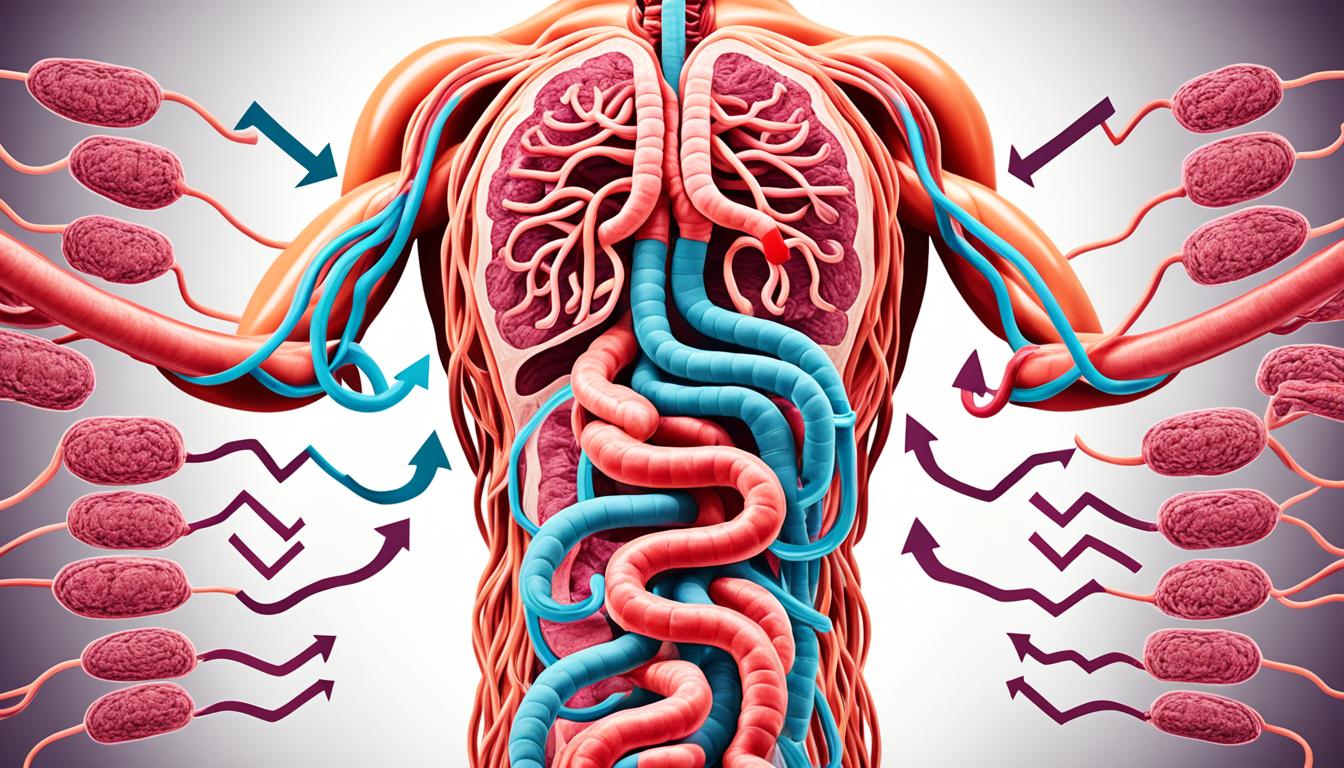Diarrhea is a common condition that many people experience from time to time. Typically, it lasts for a few days and is not considered serious. However, if you find yourself dealing with daily diarrhea without feeling sick, it may be a cause for concern. Understanding the possible causes of persistent diarrhea can help you determine the appropriate steps to take.
There are several factors that can contribute to chronic diarrhea. Some of the common causes include:
- Irritable bowel syndrome (IBS): a chronic disorder that affects the large intestine and can lead to abdominal pain or stomach ache, bloating, and changed bowel habits.
- Gastrointestinal diseases: conditions such as Crohn’s disease or ulcerative colitis can cause inflammation in the digestive tract, leading to diarrhea.
- Food allergies or intolerances: certain foods or ingredients can trigger diarrhea in individuals who are sensitive or intolerant to them.
- Bacterial infections: certain types of bacteria, such as Salmonella or E. coli, can cause persistent diarrhea.
- Medication side effects: some medications, such as antibiotics or laxatives, can disrupt the balance of bacteria in the gut and result in diarrhea.
- Certain cancers: in some cases, persistent diarrhea can be a symptom of certain types of cancer, such as colorectal cancer.
If you are experiencing ongoing diarrhea for more than a few days, it is advisable to consult with a healthcare professional. They can help diagnose the underlying cause of your symptoms and recommend appropriate treatment options. Remember, early intervention and proper management can help alleviate your discomfort and improve your quality of life.
Stay tuned to learn more about the common causes of diarrhea without illness and the symptoms associated with persistent diarrhea.
Why Do I Have Diarrhea Every Day but Not Sick?
Diarrhea can occur without an accompanying illness. Some common causes of diarrhea without sickness include:
- Allergies to certain foods: Certain individuals may experience diarrhea as a result of food allergies or intolerances. Ingesting trigger foods can irritate the digestive system and lead to loose bowel movements.
- Diseases of the intestines: Conditions such as Crohn’s disease or ulcerative colitis can cause ongoing diarrhea due to inflammation in the gastrointestinal tract.
- Consuming foods that upset the digestive system: Certain foods, such as spicy or greasy meals, can irritate the digestive system and result in diarrhea.
- Bacterial infections or other organisms: Infections caused by bacteria or other organisms can lead to diarrhea. These infections can be acquired through contaminated food or water.
- Laxative abuse: Excessive or prolonged use of laxatives can disrupt the normal functioning of the digestive system and lead to ongoing loose bowel movements.
- Running (known as “runner’s diarrhea”): Intense physical activity, such as running, can stimulate bowel movements and cause diarrhea in some individuals.
- Certain cancers: Some cancers, such as colon cancer, can cause chronic diarrhea as a symptom.
- Surgery on the digestive system: Surgical procedures involving the digestive system can sometimes lead to ongoing diarrhea as a side effect.
- Trouble absorbing certain nutrients (malabsorption): Difficulties in absorbing specific nutrients can result in chronic diarrhea. Conditions such as lactose intolerance or celiac disease can contribute to malabsorption.
- Diarrhea following constipation: While less common, individuals with irritable bowel syndrome (IBS) may experience diarrhea as a result of prolonged constipation.
Identifying the underlying cause of ongoing diarrhea is crucial for appropriate treatment and management. Consultation with a healthcare professional can help determine the specific triggers and develop an effective plan of action.

| Causes | Description |
|---|---|
| Allergies to certain foods | Diarrhea triggered by consumption of specific foods an individual is allergic or intolerant to. |
| Diseases of the intestines | Chronic diarrhea resulting from conditions like Crohn’s disease or ulcerative colitis. |
| Consuming foods that upset the digestive system | Diarrhea caused by the ingestion of foods that irritate the digestive system, such as spicy or greasy meals. |
| Bacterial infections or other organisms | Diarrhea arising from infections caused by bacteria or other organisms, often transmitted through contaminated food or water. |
| Laxative abuse | Prolonged or excessive use of laxatives disrupting the normal functioning of the digestive system and resulting in ongoing loose bowel movements. |
| Running (known as “runner’s diarrhea”) | Diarrhea triggered by intense physical activity, such as running, which stimulates bowel movements in some individuals. |
| Certain cancers | Chronic diarrhea occurring as a symptom in certain types of cancer, such as colon cancer. |
| Surgery on the digestive system | Ongoing diarrhea as a notable side effect of surgical procedures involving the digestive system. |
| Trouble absorbing certain nutrients (malabsorption) | Chronic diarrhea resulting from difficulties in absorbing specific nutrients, as observed in conditions like lactose intolerance or celiac disease. |
| Diarrhea following constipation | Occasional occurrence of diarrhea after prolonged constipation, particularly in individuals with irritable bowel syndrome (IBS). |
Symptoms and Complications of Persistent Diarrhea
Persistent diarrhea without feeling sick can have various symptoms. These may include:
- Bloating in the belly
- Thin or loose stools
- Watery stools
- An urgent feeling of needing to have a bowel movement
- Nausea
- Feel like Vomiting
While most cases of diarrhea are not serious, there are certain warning signs that require medical attention. These include:
- Blood or mucus in the stool
- Weight loss
- Fever lasting more than 24 hours
- Severe pain in the abdomen or rectum
- Diarrhea after traveling to a foreign country
- Signs of dehydration like dark urine and rapid heart rate
Chronic diarrhea can also have a significant impact on one’s quality of life and may require treatment to prevent complications.

Complications of Chronic Diarrhea
Chronic diarrhea, not related to sickness, can lead to various complications, including:
- Dehydration: Ongoing diarrhea can cause fluid loss, leading to dehydration. Symptoms of dehydration include increased thirst, dry mouth, reduced urine output, and fatigue.
- Electrolyte Imbalance: Diarrhea can disrupt the balance of electrolytes in the body, such as sodium, potassium, and chloride. Electrolyte imbalances can affect vital functions, including heart rhythm and muscle contractions.
- Nutritional Deficiencies: Chronic diarrhea may interfere with the absorption of essential nutrients, leading to deficiencies in vitamins, minerals, and other important substances.
- Impaired Quality of Life: Ongoing diarrhea can significantly impact one’s daily life, causing discomfort, embarrassment, and anxiety. It may also disrupt social activities and work productivity.
It is important to consult with a healthcare professional for proper evaluation and management of chronic diarrhea to prevent complications and improve overall well-being.
Diagnosis and Treatment of Chronic Diarrhea
If you are experiencing daily diarrhea without feeling sick for more than four weeks, it may be classified as chronic diarrhea. To determine the underlying cause, it is crucial to consult with a healthcare professional who will thoroughly evaluate your symptoms, medical history, recent dietary changes, and travel history. Physical examinations and diagnostic tests such as blood tests, colonoscopy, and stool tests for bacteria or parasites may also be ordered to aid in the diagnosis process.
Once the cause of chronic diarrhea is identified, the appropriate treatment plan can be implemented. Treatment options for chronic diarrhea vary depending on the underlying cause. In some cases, dietary changes may be recommended, such as avoiding certain foods or adopting a specific eating pattern. Medications, such as antidiarrheal agents or medications targeting the underlying condition, may also be prescribed.
Addressing specific triggers that contribute to chronic diarrhea is another essential part of the treatment process. By identifying and avoiding these triggers, it is possible to manage and reduce ongoing episodes of diarrhea. Working closely with a healthcare professional is key in diagnosing and effectively managing chronic diarrhea for long-term relief and improved quality of life.

In addition to medical interventions, certain lifestyle modifications can help alleviate the symptoms of chronic diarrhea. Staying adequately hydrated is crucial to prevent complications such as dehydration. Consuming a balanced diet, rich in fiber and nutrients, can promote healthy digestion and regular bowel movements. Managing stress levels and engaging in regular physical activity may also contribute to improved gut health.
Remember, if you are experiencing daily diarrhea without feeling sick for an extended period, it is important to seek medical attention for proper diagnosis and guidance in managing this condition.
Types of Diarrhea and Their Causes
Diarrhea can be classified into different types based on their underlying causes. Understanding the specific type of diarrhea can help in identifying the root cause and determining the most appropriate treatment.
1. Watery Diarrhea
Watery diarrhea occurs when the colon is unable to absorb enough water, resulting in loose and watery stools. Various factors can contribute to watery diarrhea, including:
- Poorly absorbed nutrients
- Infections, such as viral or bacterial gastroenteritis
- Food intolerances or allergies
- Side effects of certain medications
2. Fatty Diarrhea
Fatty diarrhea is characterized by an excessive amount of fat in the stool. This can be caused by difficulties in digesting and absorbing dietary fats. Common causes of fatty diarrhea include:
- Pancreatic enzyme deficiencies
- Gallbladder dysfunction or removal
- Inflammation or disease of the small intestine
3. Inflammatory Diarrhea
Inflammatory diarrhea is associated with inflammation in the colon and is often accompanied by symptoms like stomach pain, fever, or bleeding. Causes of inflammatory diarrhea include:
- Inflammatory bowel diseases (e.g., Crohn’s disease, ulcerative colitis)
- Infections, such as Clostridium difficile (C. difficile) or parasites
- Autoimmune disorders affecting the digestive system
Identifying the type of diarrhea can provide valuable insights into the underlying cause. If you experience chronic or recurrent loose stools, it is important to consult with a healthcare professional for a proper diagnosis and personalized treatment plan.
Long-Term Effects of Chronic Diarrhea
Chronic diarrhea can have a significant impact on an individual’s quality of life and overall health. The ongoing nature of this condition can cause inconvenience and disrupt daily activities, including work and social interactions.
Physically, persistent diarrhea can lead to dehydration and electrolyte imbalances, which can have serious consequences for vital organs such as the heart, lungs, brain, and kidneys. The body loses essential fluids and nutrients with each episode of diarrhea, resulting in a weakened immune system and a decreased ability to fight off infections.
The continuous loss of fluids and electrolytes can also lead to fatigue, weakness, and decreased energy levels. It can disrupt the body’s natural balance, affecting blood pressure, heart rate, and overall well-being.
The Impact on Quality of Life
Living with chronic diarrhea can be mentally and emotionally challenging. Individuals may experience embarrassment, anxiety, and a decreased sense of self-confidence due to the unpredictable nature of their symptoms. Fear of having an accident in public or being unable to find immediate restroom access can lead to social withdrawal and isolation.
The constant need to plan activities around bathroom breaks and the fear of flare-ups can restrict individuals’ participation in various aspects of life, including work, hobbies, and travel. The emotional strain and disruption to daily routines can contribute to feelings of frustration, irritability, and even depression.
Preventing Complications
Addressing chronic diarrhea is crucial to prevent potential complications and improve overall well-being. It is important to consult with a healthcare professional to identify the underlying cause and develop an appropriate treatment plan.
Tip: Promoting good hygiene practices, such as thorough handwashing, can help minimize the risk of infections that can aggravate chronic diarrhea.
By effectively managing chronic diarrhea, individuals can regain control over their lives and minimize the long-term effects on their health and well-being.

| Long-Term Effects of Chronic Diarrhea |
|---|
| Dehydration and electrolyte imbalances |
| Weakened immune system |
| Fatigue and weakness |
| Impact on vital organs (heart, lungs, brain, kidneys) |
| Mental and emotional strain |
| Decreased quality of life |
| Social withdrawal and isolation |
| Restrictions in daily activities |
| Impact on mental health (frustration, irritability, depression) |
Conclusion
Chronic diarrhea without feeling sick can be a distressing condition, but it is crucial to remember that there are various causes behind it. Gastrointestinal conditions, food intolerances, medications, and infections can all contribute to persistent diarrhea. Identifying the underlying cause is essential for appropriate treatment and management.
If you experience ongoing diarrhea for an extended period, it is important to seek medical attention. Healthcare professionals can help determine the cause and guide you towards effective solutions. They may recommend diagnostic tests, such as blood tests or colonoscopy, to further investigate the underlying factors.
By working closely with healthcare professionals, you can address the symptoms of chronic diarrhea and improve your overall quality of life. Remember, you don’t have to suffer alone – there are treatments available that can help you find relief.






